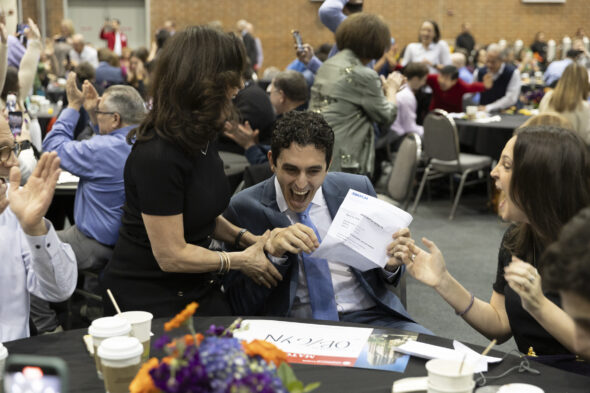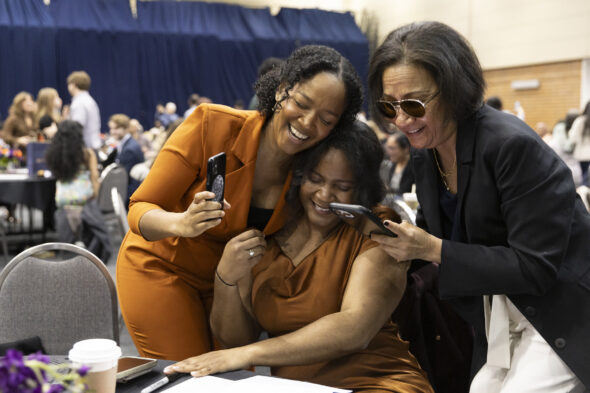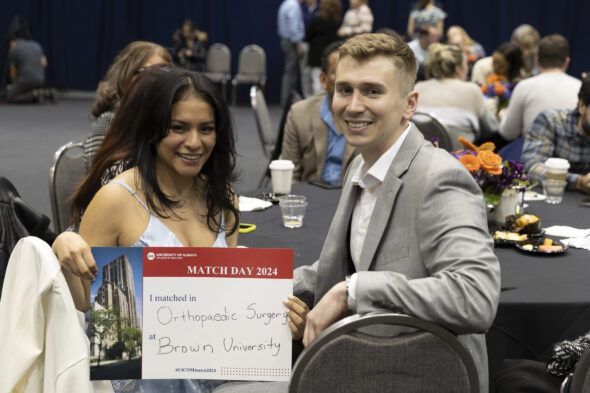Medical students learn of their match
Ten … nine … eight … As the countdown began, fourth-year medical students at the University of Illinois Chicago, their hearts pounding, waited silently to learn which residency programs they had been accepted to during the Match Day ceremony March 15 at UIC’s Isadore and Sadie Dorin Forum.

The air was thick with anticipation as they held their breath, clutching white envelopes containing the names of the residency programs where they will complete their training and begin their careers as doctors. After the final second, envelopes were ripped open, and cheers filled the air.
This year, 268 medical students from the three College of Medicine campuses were matched with programs nationwide. Of those students, 160 at UIC matched in 22 specialties in 26 states; 58 from the Peoria campus matched in 14 specialties in 21 states; and 50 from the Rockford campus matched in residency programs in 19 specialties in 16 different states. Across the country, a record 45,000 students were involved in Match Day, according to officials.
For College of Medicine students, the top-matched specialty of 2024 was internal medicine, followed by family medicine and anesthesiology. The top hospital placement was the University of Illinois Hospital.
Match Day is a coordinated event in which students nationwide are notified at the same time of their placements in residency programs, where they will receive three to seven years of specialty training.
At the UIC event, Chancellor Marie Lynn Miranda told the students that life was not necessarily about making the “right” choice but “making each choice right.” By deciding to attend the University of Illinois College of Medicine, the students chose to make sacrifices and put in the hard work to fulfill their desire to become doctors, she said.
“Today is about where you are going to go,” Miranda said. “But it is even more about all of the decisions you are going to make for this matching choice to be right for you. It’s about all of the patients you are going to serve. It is about all the communities that will be better for your presence within them.”
Dr. Robert Barish, vice chancellor for health affairs at UIC, said the COVID-19 pandemic deeply impacted the class of 2024 as it evolved over the past several years. These students learned about the critical role physicians, researchers and health professionals play in supporting our communities, Barish said.
“This moment marks another beginning in your journey,” Barish said. “Without a doubt, residency will prove challenging but worth every effort as you will continue to grow and learn in ways you haven’t realized.”
Matthew Grande from Park Ridge was sitting with his family when he opened his envelope and read that he’d been accepted for his first choice — an OB-GYN residency at Northwestern University. His family screamed with joy.
Grande said UIC helped him decide on his future.
“I loved UIC. Everyone wanted everyone to succeed,” he said.
Jhunnelle Walters, from Naperville, also was with her family at the ceremony. She earned her master’s degree in medical physiology at UIC, then attended medical school. She will pursue her residency in orthopedic surgery at Wake Forest University in North Carolina. It was her first choice.
She said she was working in the human resources field after college when she realized she wanted to become a doctor. UIC allowed her to fulfill that dream, she said.
“UIC gave me the opportunity,” Walters said. “For me, UIC is a place that didn’t tell me no, and they believed in me.”
Alondra Diaz of Chicago said that while she hoped she and her partner, Kevin Merkel, would be in the same residency program, he was matched to Columbia University, where he will focus on anesthesia. She was accepted to Brown University, where she will focus on orthopedic surgery.
“I am very happy. This was one of my top choices. While we will not be together, we are going to get excellent training,” Diaz said.
As a first-generation Mexican American, Diaz said, she dreamed of becoming a doctor after watching her parents, who don’t speak English, struggle for years to access appropriate health care.
“There are many patients in the Hispanic community affected by problems in their back and joints due to their exposure to manual labor to earn a living,” Diaz said.


